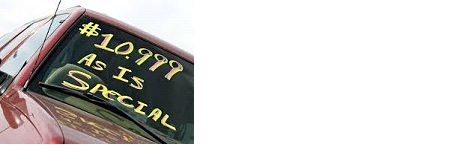Starting a Used Car Dealership Successfully
In this age when recycling/reuse is a practice that is embraced by the entire planet, manufacturers are forced to slow down on their production while opening fresh opportunities for middle men like dealers. In the car industry, recycling/reusing of cars and car parts is increasing the demand and the profitability of used car dealership. It is no wonder then that many enterprising people are checking out and engaging in this business.

Becoming a car dealer requires investment not just of money but also time and effort to yield high profits. One has the option to operate in a number of different modes to make a modest to big revenue - operating a used car lot, buying and selling cars on a retail or wholesale basis as is or with minor to major repairs, or investing in an established car dealership. While there seems to have no need for serious formal education to deal cars, it is certainly best to know the tricks of the trade.
What are some of the most basic things a new kid on the block must know about used car dealership to fare well as an automobile dealer?
1. Decide between investing in an existing business and creating a new one.
There are advantages and disadvantages that you must know and understand before you take your pick. For instance, buying or investing in an existing dealership requires a bigger investment. However, it can provide you ready resources - clients, manpower, suppliers, and reputation. Starting from a clean slate requires more work and planning, but you can direct its processes toward a reputation and a brand you have in mind. You can even offer specialized services such as online vehicle registration, and this site shows you how.
2. Study about the prevailing competition in the area of operation.
Research how your competitors are attracting customers, how they advertise, their kind of marketing strategies and advertising campaigns, their pricing schemes and deals, etc. Since car tag renewal online is now possible, try to offer that to your clients. It might turn out to be the biggest come-on for your clients.
3. Get down to the legal aspect of the business.
No business can operate legally without all the necessary papers. Make sure that you accomplish everything personally, or by hiring or asking someone to do it in your behalf. These may include business permits, and other related licenses depending on the actual activities you will do to undertake buy and sell of used cars.
4. Seal a deal for a showroom offline and online.
The location of your showroom plays an important role in your marketing. It needs visibility and traffic to entice customers to your business in the real and virtual world. It's also a good way to encourage customers to buy used cars instead of a new car.
5. Work on the details of legal documents.
When there are purchases and sales, there are documents needed to transfer ownership and to accept payments. Make sure that you have all of these ready before you make your first buy and sell.
Remember, no matter the state of the economy, people always need cars and will be saving new car. As the economy gets a bad turn, more people will sell, opt for trade-in, and go for used cars. That means better business for you.